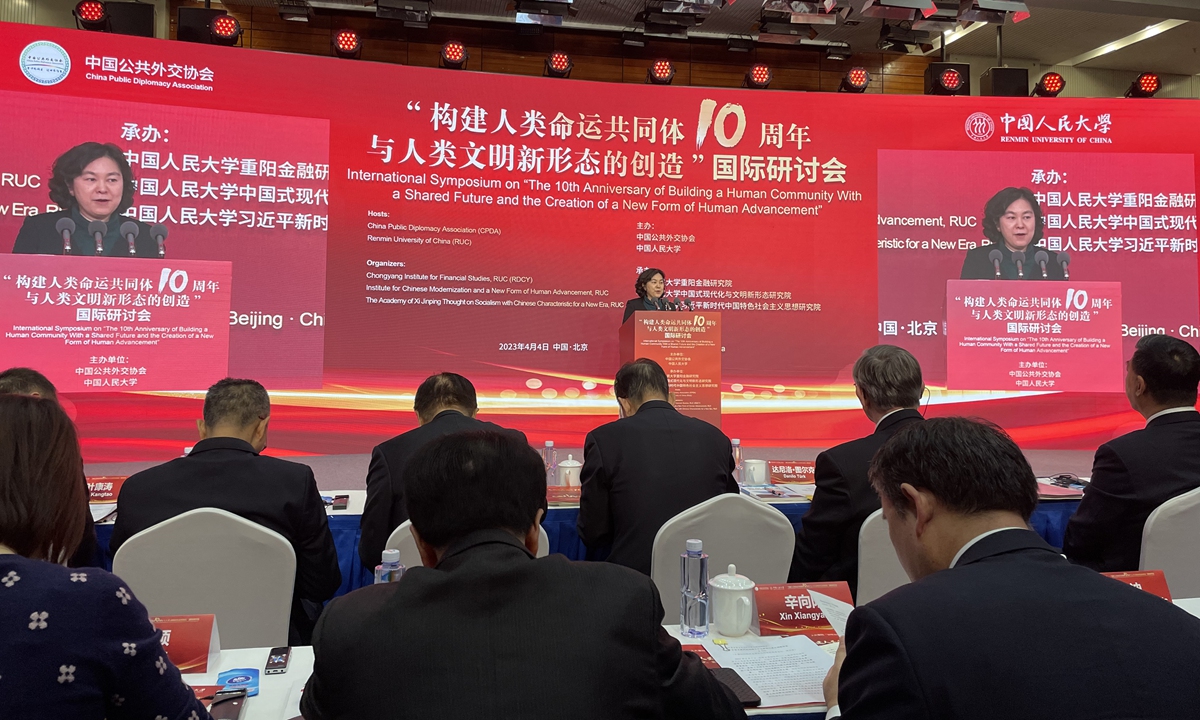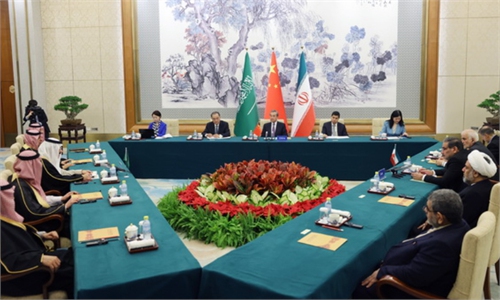China always a peace promotor in Ukraine crisis; recent Saudi Arabia-Iran dialogue a vivid practice of Global Security Initiative: Assistant Foreign Minister

Assistant Foreign Minister Hua Chunying speaks at an international symposium on the 10th anniversary of building a human community with a shared future. Photo: Chen Qingqing/GT
The China-proposed Global Security Initiative (GSI) emphasized a comprehensive and sustainable security concept, providing a new path of promoting dialogue rather than confrontation, partnership rather than alliance and win-win rather than zero sum mentality. China always promotes peace and dialogue when it comes to the Ukraine crisis, Assistant Foreign Minister Hua Chunying said on Tuesday.
Recently, Saudi Arabia and Iran successfully held dialogue in Beijing and restored their bilateral relations, which is a victory for peace, not only echoing the GSI but also a vivid practice of building a human community of shared future, Hua said.
The remarks were made at an international symposium on the 10th anniversary of building a human community with a shared future held by the China Public Diplomacy Association and the Renmin University of China on Tuesday in Beijing where a report on the subject was released.
"To achieve the sustainable peace and general security, countries should respect the sovereignty and territorial integrity, should not interfere in other countries' internal affairs. Countries should jointly safeguard justice and fairness and reject hegemony and power-driven politics, striving to solve disputes through dialogue and consultation," Hua said.
On the one-year anniversary of the Russia-Ukraine conflict, China issued a position paper titled "China's Position on the Political Settlement of the Ukraine Crisis," systematically elaborating on China's stance in 12 points.
In the paper, China called for ceasing hostilities and resuming peace talks, stopping unilateral sanctions and abandoning a Cold War mentality. It also called for respecting the sovereignty of all countries and expressed opposition to the use of nuclear weapons.
"This is a position paper which establishes a conceptual framework within which then further steps can be contemplated," Danilo Türk, former president of Slovenia and president of the World Leadership Alliance - Club de Madrid, told the Global Times on Tuesday.
Türk said the future steps include a design for a peace plan and countries who would wish to participate actively in developing such peace plan. "I believe that China would welcome participation of other countries [in developing such plan]," he said.
Multilateral platforms such as G20 and BRICS provide an opportunity to countries such as Brazil, Turkey and India to share their analysis and thinking on how to approach the matter.
A human community with a shared future is not just a throwaway phrase or empty rhetoric, but a well-thought-out diplomatic strategic concept that has been gradually developed, refined, and deepened with China's further engagement with the rest of the world and its participation in global governance, according to the report issued by the Chongyang Institute for Financial Studies of Renmin University of China (RDCY) on Tuesday.
The development of the concept of a human community with a shared future in the past decade fully reflects the robust revival of the time-honored fine tradition of Chinese culture in the modern world, proves that China's path of peaceful development transcends the power logic of Western realism, the report said.
On the heels of Spanish Prime Minister Pedro Sanchez, French President Emmanuel Macron and European Commission President Ursula von der Leyen will visit China this week from Wednesday to Friday, and they are likely to be followed by German Foreign Minister Annalena Baerbock in mid-April.
The Russia-Ukraine conflict has drawn the EU closer to Washington, and now it's important to rethink about their strategic independence and China's proposal and wisdom, experts said.
"Europe has been tragically falling into a trap amid the Ukraine crisis and it's now facing the biggest humanitarian, political and security crisis since the WWII, which is not the situation that China wants to see," according to Wang Wen, executive dean of RDCY, told the Global Times on Tuesday.
Compared to the US-proposed solution that prioritizes power, we came up with this idea of promoting a ceasefire and negotiation, and I believe the upcoming high-level European delegation's visit to China should draw some inspiration from this approach, Wang said.
"On the question of how to move toward peace, there is less clarity in the EU, and I believe that the EU needs a discussion for that, which should be organized in a way which involves, also contacts with China," Türk told the Global Times, noting that that discussion will take some time before it comes to more specific proposals for peace.
With China successfully brokering Saudi Arabia-Iran peace deal in Beijing attracting global attention, some experts believe that leading by the idea of building a human community with shared future, China will play a constructive role in more global and regional conflicts and divisions, toward which, the international community holds high expectations.
"More and more relevant leaders in areas of conflict and friction have high expectations for China, including [Ukrainian President] Zelensky recently sending an invitation to China, hoping that China will participate more deeply in resolution of conflicts," Wang of RDCY said.
I think China is engaging, step by step, in solving the problem, but also to prevent the problem from becoming more complicated, so I think the world should re-examine China's wisdom and China's plan, and don't be fooled some major powers and don't be too gullible in some of the so-called fallacies that some Western powers have always insisted on, he said.


